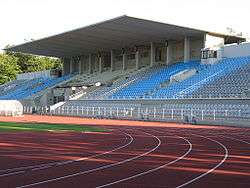This article is about the club which was known as FC Levadia Maardu between 1998–2004.
For its current feeder club, which was known as FC Levadia Tallinn between 2000–2004, see
FC Levadia II Tallinn.
FC Levadia Tallinn, commonly known as Levadia Tallinn, or simply as Levadia, is a professional football club, based in Tallinn, Estonia.
Founded in 1998, the club has played in the Meistriliiga since 1999 and have never been relegated from the Estonian top division. Levadia has won 9 Meistriliiga, 8 Estonian Cup and 5 Estonian Supercup trophies.
History
Early history
Levadia was founded on 22 October 1998, when metal manufacturing company OÜ Levadia became the official sponsor of Maardu based Esiliiga club Olümp, subsequently renamed Levadia. The club won the 1998 Esiliiga season and was promoted to Meistriliiga. Before the next season, the club merged with Meistriliiga club Tallinna Sadam and hired Sergei Ratnikov as a manager.
Levadia had tremendously successful start, winning the 1999 Meistriliiga, the 1998–99 Estonian Cup and the 1999 Estonian Supercup. Toomas Krõm won the goal scoring title with 19 goals in Meistriliiga. The club managed to defend the Meistriliiga title in the next 2000 season, along with winning another Estonian Cup and Estonian Supercup trophy. In the 2000–01 UEFA Champions League, Levadia defeated Total Network Solutions 2–6 on aggregate in the first qualifying round but lost to Shakhtar Donetsk 2–9 on aggregate in the second qualifying round. Following the loss to Shakhtar Donetsk, Ratnikov was sacked.
In January 2001, Valeri Bondarenko was appointed as a manager. Bondarenko began the season by winning the Estonian Supercup but failed to defend the Meistriliiga title, finishing the season in third place behind the winners Flora and runners-up TVMK. In 2002, Pasi Rautiainen took over as a manager. Under Rautiainen, Levadia finished the 2002 Meistriliiga season second, just two points behind Flora. After the season, Rautiainen left the club and returned to Finland for personal reasons and was replaced by Franco Pancheri. Pancheri coached Levadia for just 9 Meistriliiga matches, before he was sacked due being unable to maintain the level achieved with Rautiainen. In June 2003, Levadia hired former Estonia national football team manager Tarmo Rüütli and finished the season in third place.
Relocation to Tallinn
In 2004, Levadia moved to Tallinn, while the previously Tallinn-based reserve team with the same name changed its name to Levadia II. Under Rüütli, Levadia won the 2004 Meistriliiga season but failed to defend the title in 2005, coming second behind TVMK. Levadia defeated both Haka and Twente 2–1 on aggregate in the 2006–07 UEFA Cup qualifying rounds but lost to Newcastle United 1–3 on aggregate in the first round. Levadia won two more Meistriliiga titles in 2006 and 2007. In 2008, Rüütli left Levadia, having been hired by the Estonian Football Association to coach the Estonia national football team and was replaced by the previous assistant manager Igor Prins.[3]
Under Prins, Levadia won two consecutive Meistriliiga titles in 2008 and 2009 and an Estonian Cup in 2010. In August 2010, Prins was sacked due to disagreements with the club's board and replaced by Levadia II manager Aleksandr Pushtov.[4] Levadia finished the 2010 season second behind Flora. During the 2010–11 winter transfer window, Levadia lost several key players, including Estonian international players Tarmo Neemelo, Eino Puri and Vladimir Voskoboinikov. In July 2011, Pushtov was sacked after disappointing results in the Meistriliiga and the Champions League and replaced by Sergei Hohlov-Simson. Levadia finished the 2011 season in fourth place, lowest since the club was promoted to the Meistriliiga.
Recent history
In January 2012, Marko Kristal was hired as a manager. Levadia won the 2011–12 Estonian Cup and finished the 2012 Meistriliiga season in second place behind Nõmme Kalju. Under Kristal, Levadia won the Meistriliiga title in 2013 and defended the title in 2014, while Igor Subbotin scored club record 32 goals.
Honours
- Winners (9): 1999, 2000, 2004, 2006, 2007, 2008, 2009, 2013, 2014
- Runners-up (5): 2002, 2005, 2010, 2012, 2015
- Third place (2): 2001, 2003
- Winners (1): 1998
- Winners (8): 1998–99, 1999–2000, 2003–04, 2004–05, 2006–07, 2009–10, 2011–12, 2013–14
- Runners-up (1): 2001–02
- Winners (6): 1999, 2000, 2001, 2010, 2013, 2015
- Runners-up (7): 2004, 2005, 2007, 2008, 2009, 2011, 2014
Stadium

Kadriorg Stadium
The club's home ground is the 5,000-seat Kadriorg Stadium. Built from 1922–1926 and opened on 13 June 1926, it is one of the oldest football stadiums in Estonia. Kadriorg Stadium used to be the home ground of the Estonia national football team until the completion of the Lilleküla Stadium in 2001.[5][6]
The stadium is located in Kadriorg, at Roheline aas street 24, Tallinn.
Levadia Tallinn uses Sportland Arena and Maarjamäe Stadium artificial turfs during winter and early spring months for training and home matches.
Players
Current squad
As of 8 July 2015.[7]
Note: Flags indicate national team as defined under FIFA eligibility rules. Players may hold more than one non-FIFA nationality.
Out on loan
Note: Flags indicate national team as defined under FIFA eligibility rules. Players may hold more than one non-FIFA nationality.
Personnel
Current technical staff
|
Managerial history
|
Seasons and statistics
League and Cup
Europe
Player records
As of 7 November 2015.[8] Active players in bold.
|
Most caps in the Meistriliiga
|
Most goals in the Meistriliiga
|
See also
References
External links
|
|---|
| | 2015 teams | |
|---|
| | Meistriliiga seasons | |
|---|
| | Former teams | |
|---|
| Top division seasons
before Meistriliiga | |
|---|
|
|
|---|
| | | | National teams | |
|---|
| | Leagues | Men | |
|---|
| Women | |
|---|
| Beach soccer | |
|---|
| Futsal | |
|---|
|
|---|
| | Domestic cups | |
|---|
| | Awards | |
|---|
| | Lists | |
|---|
| | Tournaments | |
|---|
|


